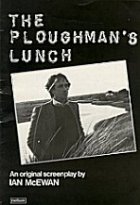
The Ploughman's Lunch Page #17
- R
- Year:
- 1983
- 107 min
- 365 Views
He pauses, relaxes into professional indifference.
EDITOR:
Still. With the party conferences
coming up in the autumn there's
bound to be some action on that
front and we'd be doing something
anyway. It won't all be Falklands
business. James, is there something
in there for us, if we could tie
it in with something else?
JAMES:
Well, it's all a bit cranky and
small scale. Vegetarians, hippies,
disturbed housewives. Local radio
story, I'd say, if that. They're
mad.
EDITOR:
Oh well. Just an idea. Now. Can
we talk about this radio-car cock-
up yesterday. Chris?
INT. NEWSROOM STUDIO - LATE MORNING.
Two hours later. The studio. James and Charles sit at
the table, as in Scene Three. Charles reads. He is
obviously distressed but his voice remains under control.
James watches anxiously.
CHARLES:
It was an emotional occasion.
Hundreds of small craft led by six
fire tugs making fountains of water
formed an escort flotilla, and
four Wasp helicopters flew past in
salute. In the City the Financial
Times Ordinary Shares Index was
down ten points an hour ago at
529.8. BBC Radio News.
In the Control Room, the minute hand of the clock reaches
five past the hour; the sweep hand reaches the twelve on
Charles's last word. The Controller pushes a button.
Charles slumps forward.
JAMES:
My God that was close! Well done,
Charles. I knew you wouldn't let
me down. But God! We almost didn't
make it.
James is standing, gathering papers. He bustles out,
indifferent. We CLOSE IN on Charles. Unseen by anyone,
he is just beginning to cry.
INT. JAMES'S FLAT - EVENING
James is typing rapidly. There is a growing pile of
typewritten sheets to one side. We go over his shoulder
and look closely at the map, Egypt, the desert . . .
EXT. THE BARRINGTON HOUSE, NORFOLK - LATE MORNING
A few days later. James has just arrived and switched his
engine off. But for the wind and birdsong, silence. There
is no reply when he tries the front door. A note pinned
to the door reads: 'Gone for a walk. Follow footpath.
Susan.'
EXT. DYKE - DAY
James walks along the dyke, across the marshes. Below
him, on the sand, in the distance, are two figures. James
stops to watch them. Matthew and Susan are deep in
conversation — evidently a serious matter. They seem to
be making an agreement. Matthew puts his head on Susan's
shoulder, and they walk on, unaware of James.
INT. DINING-ROOM - NIGHT
A burst of laughter. It is dinner. Seated are Ann,
Matthew, Tom, Susan, James and JACEK, a professor from
Central Europe, mid-sixties, an old friend of Ann's. Betty,
the housemaid, serves.
JACEK:
(heavy accent)
The second is less pleasant. A
Pole is confronted by a German and
a Russian soldier. Which should
he shoot first? The German first,
the Russian second. Duty before
pleasure.
A more subdued response.
TOM:
I've heard that one at school.
JACEK:
Then you are a well-educated young
man.
(to Ann)
Tom has been reciting his English
kings and queens to me.
JAMES:
And to me.
JACEK:
Haven't you socialist historians
in the West made kings and queens
out of date in schools?
ANN:
We keep trying.
MATTHEW:
I can tell you that the history of
the monarchy is alive and well in
the national memory. I shot a
commercial - a series of vignettes
of kings and queens — Henry VIII,
Mary —
TOM:
Elizabeth I.
MATTHEW:
Elizabeth I, and so on - and we
had a fantastic response.
SUSAN:
What were you advertising?
MATTHEW:
Oh, some new lager.
JACEK:
I'm pleased to hear that there is
at least some national memory. I
agree with Ann that the British
forget too quickly. Here you have
enviable freedoms, and yet no
monuments to those who struggled
to win them for you. Now that is
why I think there is hope for the
Poles, whoever occupies their
country. They remember their dates,
and they keep adding to them.
December 1981, Gdansk 1980, 1976,
1970. Katyn 1940, 1922 and so on.
It's a subversive list. Say it
out loud on the streets of Warsaw
and you might get arrested.
Translation
Translate and read this script in other languages:
Select another language:
- - Select -
- 简体中文 (Chinese - Simplified)
- 繁體中文 (Chinese - Traditional)
- Español (Spanish)
- Esperanto (Esperanto)
- 日本語 (Japanese)
- Português (Portuguese)
- Deutsch (German)
- العربية (Arabic)
- Français (French)
- Русский (Russian)
- ಕನ್ನಡ (Kannada)
- 한국어 (Korean)
- עברית (Hebrew)
- Gaeilge (Irish)
- Українська (Ukrainian)
- اردو (Urdu)
- Magyar (Hungarian)
- मानक हिन्दी (Hindi)
- Indonesia (Indonesian)
- Italiano (Italian)
- தமிழ் (Tamil)
- Türkçe (Turkish)
- తెలుగు (Telugu)
- ภาษาไทย (Thai)
- Tiếng Việt (Vietnamese)
- Čeština (Czech)
- Polski (Polish)
- Bahasa Indonesia (Indonesian)
- Românește (Romanian)
- Nederlands (Dutch)
- Ελληνικά (Greek)
- Latinum (Latin)
- Svenska (Swedish)
- Dansk (Danish)
- Suomi (Finnish)
- فارسی (Persian)
- ייִדיש (Yiddish)
- հայերեն (Armenian)
- Norsk (Norwegian)
- English (English)
Citation
Use the citation below to add this screenplay to your bibliography:
Style:MLAChicagoAPA
"The Ploughman's Lunch" Scripts.com. STANDS4 LLC, 2024. Web. 28 Dec. 2024. <https://www.scripts.com/script/the_ploughman's_lunch_500>.



Discuss this script with the community:
Report Comment
We're doing our best to make sure our content is useful, accurate and safe.
If by any chance you spot an inappropriate comment while navigating through our website please use this form to let us know, and we'll take care of it shortly.
Attachment
You need to be logged in to favorite.
Log In